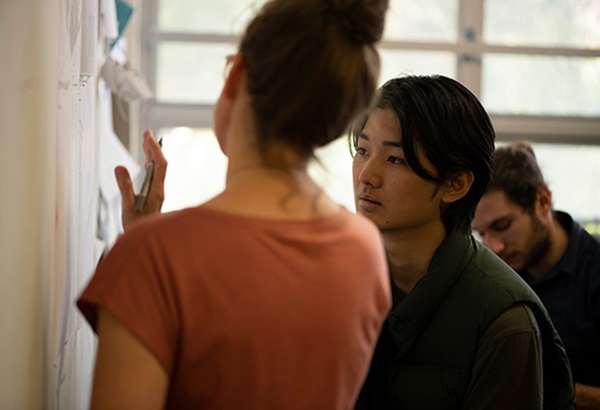Don’t let your worries about going back to uni to study postgrad keep you from being a lifelong learner! We’re here to debunk a few of those concerns you might be having about starting a postgrad degree and to let you know that uni isn’t just for your early 20s.
The postgrad uni life could be an amazing life experience you’ll never forget – so stop worrying and start considering applying today!
1. You’ve forgotten how to study
So, it’s been a while since you went to uni or high school and you’re worried you might not remember how to cram all that information in your brain? Don’t be! You’re older, wiser and probably don’t go out partying as much as you did when you were younger.
Studying takes planning, listening, time management and a strong interest for what you’re learning. After years of life and work experience, you’ve likely already got the discipline you need. And, now that you’ve truly figured out your passions and your future goals, you’ll be more motivated studying for a degree that will set you up for success and let you dive deeper into your chosen subject.
Plus, you can always ask for help. UWA’s Study Smarter program offers academic support including one-to-one meetings with staff, access to heaps of online learning resources, academic skills workshops and study help after hours.
If we haven’t eased your concerns yet, check out our 8 top study tips for postgrads.
2. You’ll be too busy with work and study and family and friends…and everything else!
Postgrad study at UWA can be done at your own speed. You can study full-time or part-time depending on your lifestyle and we even offer some fully online courses.
We also have a range of course options that take different lengths of time: from 6 months to 2 years. If you’re not sure you’ll be able to commit to a full master’s that takes 2 years full-time, you could start with a graduate certificate. The units you take in the shorter degree can then be stacked to make up a master’s degree in the same study area.
UWA is also very conveniently and centrally located by the picturesque Swan River. You’ll be able to pop to campus around work hours, taking one of the many public transport options available to you. Why not hang around and work remotely on campus? Find a beautiful spot on our stunning grounds, grab a coffee at one of our cafes or grab a desk in one of our five libraries.
And don’t forget, your lecturers and tutors will be older and wiser just like you. They’ll also be experiencing the same challenges life brings: balancing family commitments, work, a social life and sometimes they’re also studying too to stay up to date within their field. They’ll likely be more understanding of your situation and at the end of the day, they just want to see all of their students succeed.

3. You won’t fit in with the ‘young crowd’
UWA’s student base is diverse – across ages, cultures and backgrounds. You’re sure to find your community and make connections for life.
We are known for our unrivalled student life (and it’s not all about partying). With over 160 clubs and societies, Australia's most active Student Guild, competitive and social sports, volunteering opportunities and networking events – you’ll have every opportunity to get involved and connect with your peers.
There’s even a dedicated UWA Postgraduate Students’ Association – you’ll automatically be made a member when you enrol in a postgrad course at UWA. They organise social and networking events throughout the year to foster a sense of community among postgraduates.
4. It’s too expensive
No matter your stage of life or personal circumstances, postgrad study is more financially possible than you think. You can apply for one of our postgrad Commonwealth Supported Places (CSP) which are subsidised by the Australian Government, apply for a scholarship, take advantage of UWA’s industry partner discounts or even ask your employer to help out. We’ve pulled together our top tips for how to save on your postgrad degree so you can explore all the options.
Plus, according to the 2021 Graduate Outcomes Survey Longitudinal National Report, salary outcomes for postgrad coursework graduates are much higher than for undergraduates – a whopping $23,000 and increasing further with a postgraduate research degree. So, what you pay in your degree may lead to a higher pay level after you graduate anyway!
5. A postgrad degree won’t help you get a better job
The numbers don’t lie! According to a 2018 QILT survey, full-time postgraduate coursework employment was at 92.4% within four months of graduation. If you’re going for a job against someone with a similar background who just has a bachelor’s qualification, you’ll stand out for the greater depth of knowledge that a postgrad degree brings.
Completing a degree alongside your job sends a signal to your employer that you’re putting in the effort and that you want to advance. This kind of dedication demonstrates your commitment to your role, your organisation and your field or industry. Having an added qualification can be a great tool to negotiate a promotion or pay rise as tangible evidence that you’ve gained additional skills and knowledge to help your organisation innovate.
If you’re after a new job or a career change, you’re adding a qualification to your resume and you’ll have an opportunity to connect with industry. Studying a postgrad degree allows you to make valuable connections that could help you advance in your future career. You’ll be able to connect with like-minded peers, as well as professionals and researchers who are already working where you want to be. These could prove powerful when it’s time to enter your chosen industry.
So don’t let those niggling doubts stand in your way!







